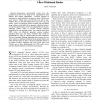Free Online Productivity Tools
i2Speak
i2Symbol
i2OCR
iTex2Img
iWeb2Print
iWeb2Shot
i2Type
iPdf2Split
iPdf2Merge
i2Bopomofo
i2Arabic
i2Style
i2Image
i2PDF
iLatex2Rtf
Sci2ools
ICRA
2010
IEEE
2010
IEEE
All-weather perception for man-portable robots using ultra-wideband radar
—Autonomous man-portable robots have the potential to provide a wide range of new capabilities for both military and civilian applications. Previous research in autonomy for small robots has focused on vision, LIDAR, and sonar sensors. While vision and LIDAR work well in clear weather, they are seriously impaired by rain, snow, fog, and smoke. Sonar can penetrate adverse weather, but has limited range outdoors, and suffers from specular reflections indoors. For the Daredevil Project, we have investigated the use of ultrawideband (UWB) radar to provide obstacle detection capabilities for man-portable robots. Our research shows that UWB radar can effectively penetrate adverse weather, including dense fog, and detect obstacles that would be undetectable by vision or LIDAR under the same conditions. We have developed filtering algorithms that process the raw radar returns to eliminate reflections from ground clutter and make obstacles easier to detect. We have tested this system on an iR...
ICRA 2010 | Lidar | Man-portable Robots | Robotics | UWB Radar |
| Added | 26 Jan 2011 |
| Updated | 26 Jan 2011 |
| Type | Journal |
| Year | 2010 |
| Where | ICRA |
| Authors | Brian Yamauchi |
Comments (0)

